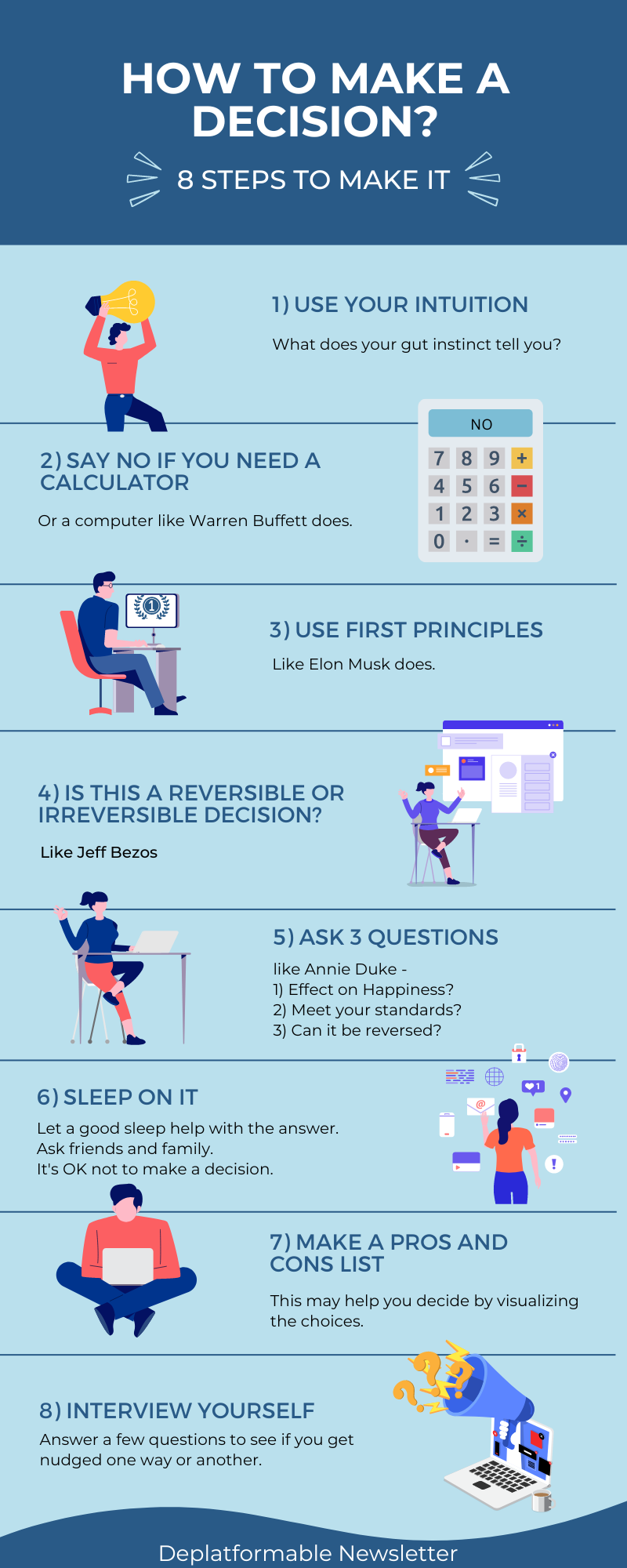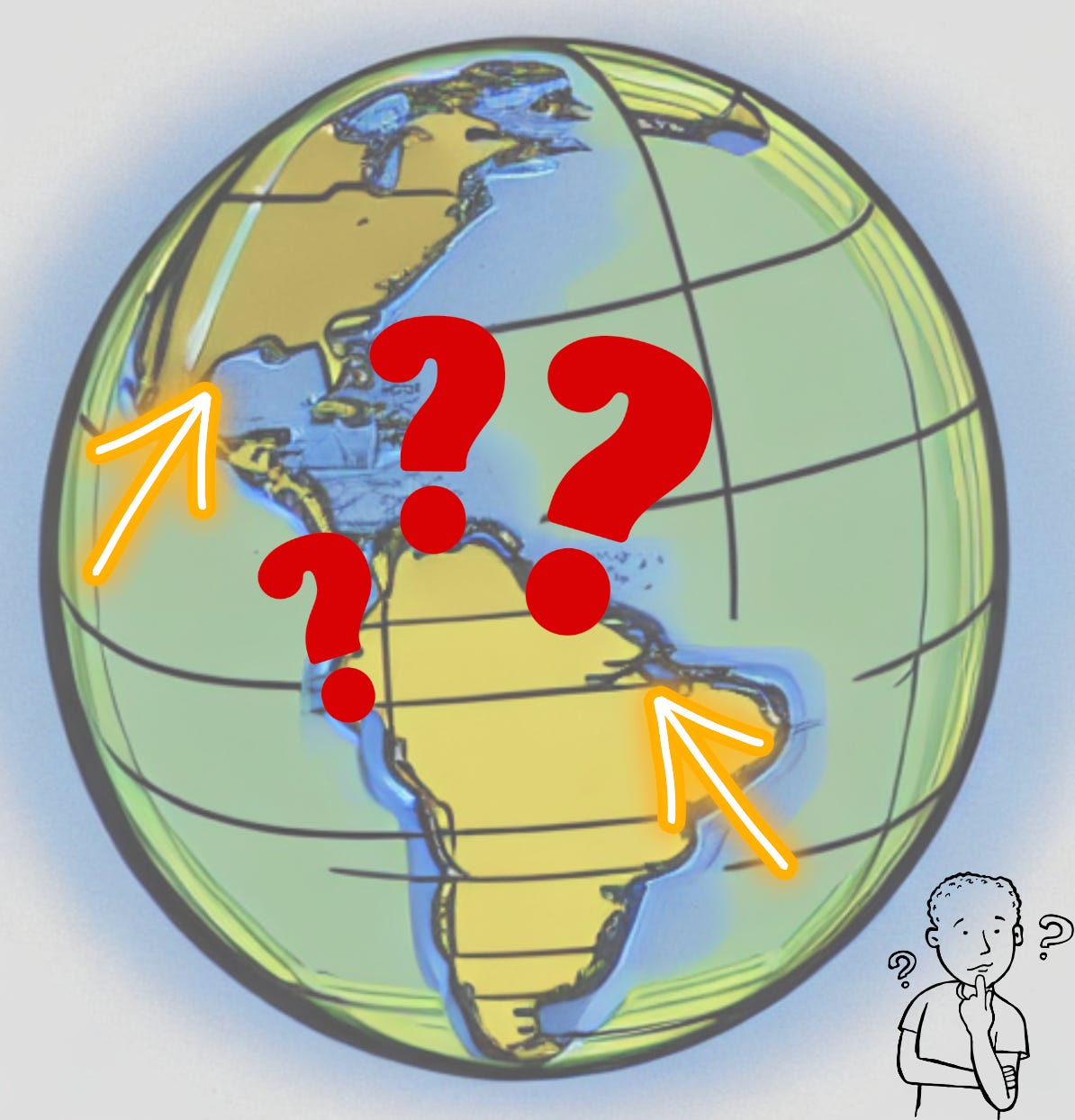A decision is just a dialog we have with ourselves about some thought involving something we will either do or not do in the future. Enacted by an action on our part.
Most day-to-day decisions are inconsequential. Whatever option we choose will not impact the quality of our lives. We may feel bad after we wear the wrong color shoes after labor day. Or choose the T-Bone steak instead of the Prime Rib. So what?
It is best to let our intuition answer these inconsequential decisions. For example, our intuition, or gut instinct, is probably the best way to play a Wordle puzzle line. Our first thought without asking ourselves any questions to get an answer about a “Wordle” entry is usually correct.
Intuition and gut instinct is built into each of us. It’s in our DNA, passed through the time when we were living in caves, killing our supper with crude tools, and playing Wordle on stone tablets.
To let intuition work is to accept the first thought that comes up and go for it. The enemy of intuition is overthinking. We negate the advantages of intuitiveness by trying to come up with new answers by running through all the thoughts. Best to go with the first thing that pops into your head.
But sometimes we have to make a BIG decision. Should we move to a different city to be closer to our parents or children? Will becoming a Doctor be better than studying to become an Engineer? Should I get a loan for that new mid-engine Corvette I want?
So how do we make BIG, Important decisions? Decisions that will affect the trajectory of our current life’s path.
A Couple of Ways
“One way might be defaulting to saying no, as Steve Jobs did. Or saying no to any decision that requires a calculator or computer, as Warren Buffett does. Or it might mean reasoning from first principles, as Elon Musk does”. (source: https://fs.blog/reversible-irreversible-decisions/)
Regret Minimization Framework
Here is Jeff talking about how he made his decision to start up an internet book selling business when he had a great job already…
Irreversible?
I like to use a simple question when making some decisions…“is this a reversible or irreversible decision?“
If it is reversible, we can get out of it if it proves to be wrong or dangerous. We will lose our time investment however.
But if it is irreversible, then we have to live or die with the consequences. Wanna go skydiving?
More Ways
For two decades, Annie Duke was one of the top poker players in the world, winning several championships during her career. She has since been writing books on what she has learned by psyching out the best poker players she has played against.
Annie says if you take too much time deciding on a little decision, you become branded as indecisive.
If you act too quickly you may be branded as rash or careless.
We want to be somewhere in the middle by asking 3 questions:
What effect does that decision have on your happiness?
After researching the options - Do they meet your standards and
pass your satisfactory threshold?
But once you find or create two or more options that rise above your threshold, the decision is easy. If a vacation to Paris has a 90 % chance of being a great vacation but a vacation to Rome might have a 93% chance of being a great vacation - you might as well flip a coin - because you're probably going to be happy either way.
The 3rd question is Jeff Bezo’s question above.
Sleep on it
Don’t decide until the next day. Ask your people what they think you should do. Will the decision impact others?
Remember that it is OK NOT to make a decision. “Status Quo and Go”®.
Regrets
Here is a Podcast interview with the author of The Power of Regret - Daniel Pink - about regrets, and how to make un-regrettable decisions:
https://www.nudgepodcast.com/podcast/episode/29d1202c/61-the-science-of-stress-and-3-ways-to-beat-it
From the Book:
The Regret Optimization Framework. This revised framework is built on four principles:
In many circumstances, anticipating our regrets can lead to healthier behavior, smarter professional choices, and greater happiness.
Yet when we anticipate our regrets, we frequently overestimate them, buying emotional insurance we don’t need and thereby distorting our decisions.
And if we go too far—if we maximize on regret minimization—we can make our situation even worse.
At the same time, people around the world consistently express the same four core regrets. These regrets endure. They reveal fundamental human needs. And together, they offer a path to the good life.
If you’re buying lawn furniture or a microwave oven, that decision is unlikely to involve any fundamental, enduring human need. Make a choice and move on. You’ll be fine.
If the decision does involve one of the big four, spend more time deliberating. Project yourself into the future—five years, ten years, at age eighty, whatever makes sense.
From that future vantage point, ask yourself which choice will help you build your foundation, take a sensible risk, do the right thing, or maintain a meaningful connection. Anticipate these regrets. Then choose the option that most reduces them. Use this framework a few times, and you will begin to see its power.
Our everyday lives consist of hundreds of decisions—some of them crucial to our well-being, many of them inconsequential. Understanding the difference can make all the difference. If we know what we truly regret, we know what we truly value. Regret—that maddening, perplexing, and undeniably real emotion—points the way to a life well lived.
More about Regret: New Research Reveals What People Regret Most of All: 5 Ways to Make Sure You Never Do
Pros and Cons
Make a list of the Pros and Cons as a two column list. The Pros arguments are FOR the decision, and the Cons are against the decision. If one side has more arguments than the other, the answer should become clear.
You could also rate each argument on a scale (1 to 10 in importance), and let math determine the answer.
Second Order Thinking
Second-order thinking is a useful mental model to make better decisions in life.
(…source)
Interview Yourself
Ask yourself some of these questions to see if you really want to make the important decision.
Will I become a better person if I do this thing?
Will my people be proud of me after I accomplish the thing?
Will I be happier in a month, in 6 months, in a year from now if I do the thing?
Who all will benefit from me doing this thing?
Who will be negatively affected if I do this thing?
What will the impact be on my time or health if I do the thing?
What are all the monetary costs relating to doing the thing?
Do you think you may regret NOT doing the thing 5 years (and different time durations) from now?
How badly would you feel if you do the thing and you regret it after some time?
What if the thing takes way longer, and is much more challenging to do after starting?
Is there a way to back out of the thing after starting?
Could something take place to harm another person if I go ahead and do the thing?
Who and how soon will you tell about the thing you just did?
If I put this off until next (week, month, year) will the timeframe jeopardize the required outcome of the thing? Or will it have to be done today to get the full rewards of a positive decision?
Additional Article: Oct. 4 2023
Elon's decision making: an anecdote compilation
I’d love it if you decide to like this article, comment, or share the infographic with your friends. 😀
I’ve always thought that we can decide to be happy and content. Do you agree? Try it!
PS: My wife has decided that I don’t want the Corvette!
Peace!











Once again, great stuff Paul. I really enjoyed this one and I am definitely an overthinker... Big Time! Thanks for sharing 👏👏👏
I had a chuckle when I read your article about decisions and imagining yourself 80 and seeing if you would have regrets about something you want to decide. As I'm almost 80, I glanced back and found a little to regret other than I lacked spiritual perspective and believed I was a doing person deciding with a dominating left brain in its virtual projected world. Of course, I did pretty well and am still here, relatively happy and healthy. So, whatever transpired in my earlier years was on the positive side of learning and tapping into a more balanced way of being, choice, and acceptance of gifts and limitations.
I still get stuck with tough decisions, but it is more about letting go and accepting what the universe brings in each moment of splendor and awe. This morning, I had to decide whether to drag my lazy bones out of bed to do my several times per week swim, but I did and now feel great about it. At the time of the dark and cold morning when I awoke, I had to think of how I would regret it if I didn't make an effort. I took the cold plunge to swim. Still, I found my spiritual inspiration got me there to release myself from my mentally configuring and reluctant body for a heightened state of integration and well-being.